An Appraisal of Juvenile Justice in Nigeria
Added on 2023-04-21
23 Pages6842 Words170 Views
Running Head: INTERNATIONAL HUMAN RIGHTS
International Human Rights
Name of the Student
Name of the University
Author Note
International Human Rights
Name of the Student
Name of the University
Author Note
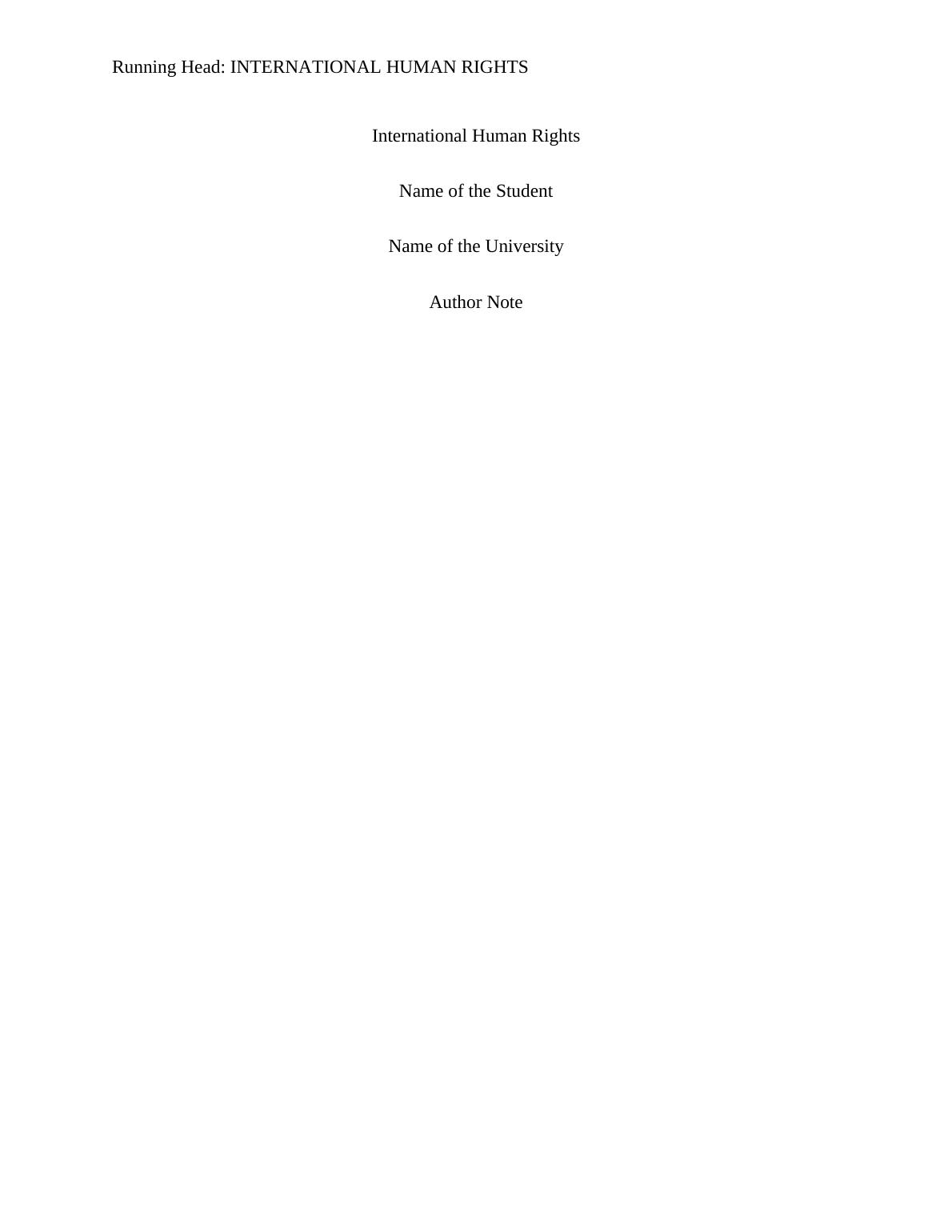
1INTERNATIONAL HUMAN RIGHTS
Research Trail
The topic on which I worked was AN APPRAISAL OF JUVENILE JUSTICE IN
NIGERIA; A CASE STUDY OF CHILD'S RIGHT TO INDEPENDENT LEGAL
REPRESENTATION AND FREE TRIAL". The module directed me to investigate on the nature
and effectiveness of child rights in Nigeria. It specifically dictated me to focus on the extent to
which the Nigerian Child’s Rights comply with the international child rights. In the due to course
of my work I have received the help of my supervisor who suggested me to collect information
from the already existing secondary data and compare them with the conventions of child rights
of UN.I have taken the help of articles, journals and, news reports along with the Child’ Rights
Manual of Nigeria. The authors of these articles are scholars and the articles are the result of
their life-long research on the topic. Hence, the article is highly reliable in terms of gathering
data on the laws, codes, sections and case studies under the Nigerian context.
The first article is written by OlayinkaAtilola, Bolanle Ola, GbonjubolaAbiri and
Abiodun O. Adewuya. and explores the relationship between the quality of life and
psychopathology. It also examines the well-being of the young offenders. The article is aimed at
testing the hypothesis that lower quality of life is associated with the self-rated psychopathology
in the adolescents in the correctional institutions of Lagos. The methods used in the article to
assess the psychopathology were the Strength and Difficulty Questionnaires. The quality of life
was measured by the Paediatric Quality of Life. The findings of the report suggest that although
it is difficult discern the relationship between the two components, in the adolescents, it is
realistic to assume that mental health issues treatment can leave a positive impact on the
rehabilitation. It has helped me to assess the psychological aspect of the juvenile offenders and
Research Trail
The topic on which I worked was AN APPRAISAL OF JUVENILE JUSTICE IN
NIGERIA; A CASE STUDY OF CHILD'S RIGHT TO INDEPENDENT LEGAL
REPRESENTATION AND FREE TRIAL". The module directed me to investigate on the nature
and effectiveness of child rights in Nigeria. It specifically dictated me to focus on the extent to
which the Nigerian Child’s Rights comply with the international child rights. In the due to course
of my work I have received the help of my supervisor who suggested me to collect information
from the already existing secondary data and compare them with the conventions of child rights
of UN.I have taken the help of articles, journals and, news reports along with the Child’ Rights
Manual of Nigeria. The authors of these articles are scholars and the articles are the result of
their life-long research on the topic. Hence, the article is highly reliable in terms of gathering
data on the laws, codes, sections and case studies under the Nigerian context.
The first article is written by OlayinkaAtilola, Bolanle Ola, GbonjubolaAbiri and
Abiodun O. Adewuya. and explores the relationship between the quality of life and
psychopathology. It also examines the well-being of the young offenders. The article is aimed at
testing the hypothesis that lower quality of life is associated with the self-rated psychopathology
in the adolescents in the correctional institutions of Lagos. The methods used in the article to
assess the psychopathology were the Strength and Difficulty Questionnaires. The quality of life
was measured by the Paediatric Quality of Life. The findings of the report suggest that although
it is difficult discern the relationship between the two components, in the adolescents, it is
realistic to assume that mental health issues treatment can leave a positive impact on the
rehabilitation. It has helped me to assess the psychological aspect of the juvenile offenders and
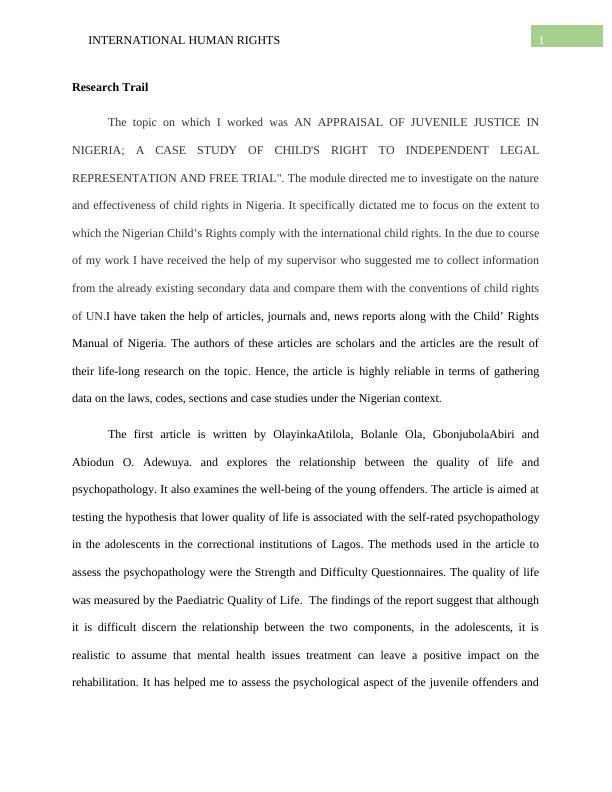
2INTERNATIONAL HUMAN RIGHTS
the life they are provided in the child correction homes of Nigeria and get a deeper insight into
the systems of the country.
The next article has been equally helpful for me to analyze the mental health service
provided under the juvenile justice system. This article is aimed at exploring the limitations of
the mental health service in the juvenile justice system in Nigeria. The article further highlights
the suitable steps required to remold this particular system in the modern mental health services
especially in Nigeria. The authors of this article namely O. Atilola, G. Abiri and B. Ola have
contributed to the article and the data they have provided are of great help and importance.
The third article I have taken help from is written by Oluwagbenga Michael Akinlabiis
one of the most beneficial articles to accomplish my course work. This article assesses the
strength of the procedural justice impacts as compared to the other police behaviors. It is also a
well documentation of the latent characteristics of the youth of Nigeria. It has been found that in
the modern and more developed western societies especially the UK and the USA, the judgement
of people regarding the policies rest on the procedural justice. The article is aimed at exploring
the chances of bridging this gap in literature. The authors have collected primary data from six f
the secondary schools of Nigeria. The results inevitably confirm the importance of procedural
justice for determining the effectiveness of the police and their legitimacy too.
The next resource which has been of greater help for me is a book written by Franklin E.
Zimring and David S. Tanenhaus. The volume has been contributory of a series of studies
regarding the juvenile justice. The aim of this series was to spread the spatial, the temporal and
the other disciplinary aspects which are available for the youth policy students along with the
juvenile court. The book Age of Anxiety, further reveals the social histories help to analyze the
youth crime that is a significant concern in the twentieth –century context. This book is a
the life they are provided in the child correction homes of Nigeria and get a deeper insight into
the systems of the country.
The next article has been equally helpful for me to analyze the mental health service
provided under the juvenile justice system. This article is aimed at exploring the limitations of
the mental health service in the juvenile justice system in Nigeria. The article further highlights
the suitable steps required to remold this particular system in the modern mental health services
especially in Nigeria. The authors of this article namely O. Atilola, G. Abiri and B. Ola have
contributed to the article and the data they have provided are of great help and importance.
The third article I have taken help from is written by Oluwagbenga Michael Akinlabiis
one of the most beneficial articles to accomplish my course work. This article assesses the
strength of the procedural justice impacts as compared to the other police behaviors. It is also a
well documentation of the latent characteristics of the youth of Nigeria. It has been found that in
the modern and more developed western societies especially the UK and the USA, the judgement
of people regarding the policies rest on the procedural justice. The article is aimed at exploring
the chances of bridging this gap in literature. The authors have collected primary data from six f
the secondary schools of Nigeria. The results inevitably confirm the importance of procedural
justice for determining the effectiveness of the police and their legitimacy too.
The next resource which has been of greater help for me is a book written by Franklin E.
Zimring and David S. Tanenhaus. The volume has been contributory of a series of studies
regarding the juvenile justice. The aim of this series was to spread the spatial, the temporal and
the other disciplinary aspects which are available for the youth policy students along with the
juvenile court. The book Age of Anxiety, further reveals the social histories help to analyze the
youth crime that is a significant concern in the twentieth –century context. This book is a
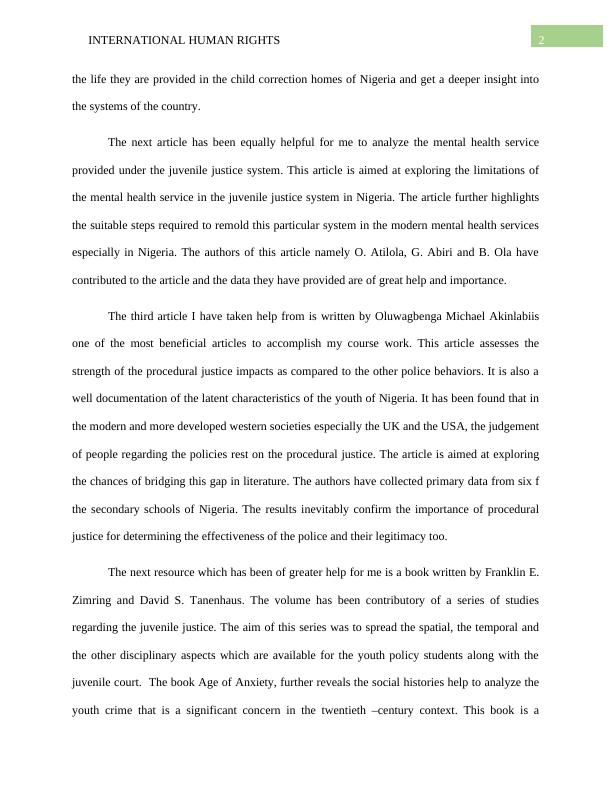
3INTERNATIONAL HUMAN RIGHTS
commendable document fir understanding and knowing the division of labor related to the child
justice in the global context. This volume has captured the social histories with greater details. I
have become familiar with the child justice scenario of the world at large.
The next article is titled as Restorative justice and non-custodial measures: Panacea to
recidivism and prison congestion in Nigeria. The article re-explores the impacts of non-
reformation in the correctional institutes, the delay in the trials, prison congestions, bureaucracy,
on the foreign investment, social justice and principles of human rights. It consequently affects
the infrastructural, economic and development of the state. Since the criminal justice system
includes the police m the courts and the correctional agencies who are responsible for providing
solutions to the legal issues, these departments have to be reliable enough. The article precisely
recommends a suitable framework for praising the traditional system that is the ‘imprisonment
‘to be focused on. It also asks the departments to pursue more offender engagement for the
prohibition of crimes having guaranteed the punishment of the criminals or the offenders.
Hence, it can be said that the resources I selected to take help from have proved highly beneficial
for me in terms of providing me necessary information and reviewing the other aspects of the
central theme.
The article of Ogwezzy, Adebayo and Kekere (2016), is a significant research for the
case. The reason behind it significance is that the article justifies the need of a different approach
to handle the children or teenagers who committed crime. However in major portion of the
article, the authors are concerned with the infrastructure inside the correctional homes and
environment. Along with that, the concerns like the bureaucracy, the delay in trial and the lack of
investment are portrayed in the paper by the authors as the factors responsible for the significant
delay in the production of the justice. A major finding of the paper is the impact that the criminal
commendable document fir understanding and knowing the division of labor related to the child
justice in the global context. This volume has captured the social histories with greater details. I
have become familiar with the child justice scenario of the world at large.
The next article is titled as Restorative justice and non-custodial measures: Panacea to
recidivism and prison congestion in Nigeria. The article re-explores the impacts of non-
reformation in the correctional institutes, the delay in the trials, prison congestions, bureaucracy,
on the foreign investment, social justice and principles of human rights. It consequently affects
the infrastructural, economic and development of the state. Since the criminal justice system
includes the police m the courts and the correctional agencies who are responsible for providing
solutions to the legal issues, these departments have to be reliable enough. The article precisely
recommends a suitable framework for praising the traditional system that is the ‘imprisonment
‘to be focused on. It also asks the departments to pursue more offender engagement for the
prohibition of crimes having guaranteed the punishment of the criminals or the offenders.
Hence, it can be said that the resources I selected to take help from have proved highly beneficial
for me in terms of providing me necessary information and reviewing the other aspects of the
central theme.
The article of Ogwezzy, Adebayo and Kekere (2016), is a significant research for the
case. The reason behind it significance is that the article justifies the need of a different approach
to handle the children or teenagers who committed crime. However in major portion of the
article, the authors are concerned with the infrastructure inside the correctional homes and
environment. Along with that, the concerns like the bureaucracy, the delay in trial and the lack of
investment are portrayed in the paper by the authors as the factors responsible for the significant
delay in the production of the justice. A major finding of the paper is the impact that the criminal
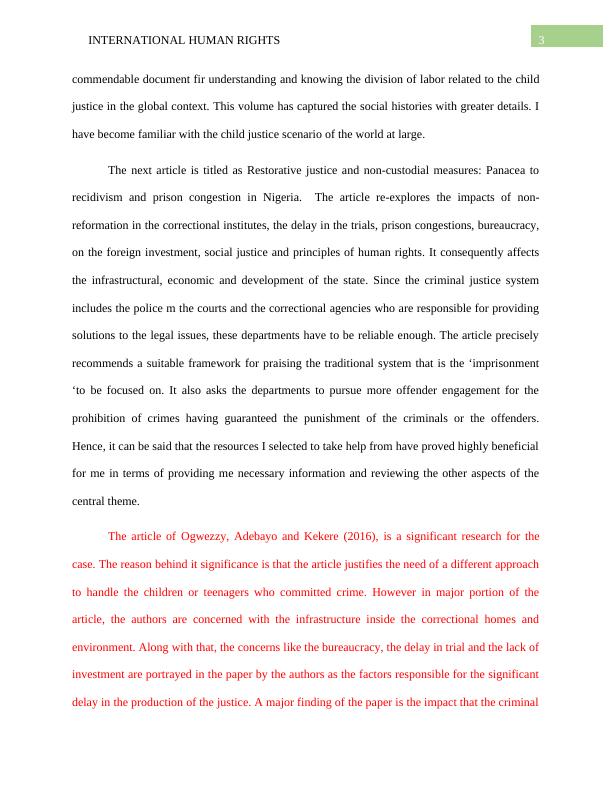
4INTERNATIONAL HUMAN RIGHTS
engagement or the offender management. During the days of the juvenile imprisonment, the
mode of correction which relates to the punishing nature, is said to be impractical for the
children and the teenagers. Rather, the authors are able to comment on the success of the other
method which is the offender engagement. The form of correction is seen to have a much greater
impact than the punishment and thus the functionality of the justice system portrayed in the
paper is of great significance in the appraisal of the juvenile justice with a precise focus on the
economic growth, stability and the development of the country.
The article of is of great significance in the specification of the human rights that the
children and juvenile offenders are eligible to experience. The paper is notably linked to the
measures that United Nations Security Council has taken. The authors are able to assess the
measures that can be considered as the unilateral coercive measures and at the same time
evaluates the impact of the comprehensive measures of the United Nation’s Security Council.
Along with that, the paper is significant in the evaluation of the conditions under which the
means of pressure can be applied over states, legal entities or a specific individual. The
experience of the human rights of the children or the juvenile offenders are well guarded by the
findings where the authors portrayed that the means of pressure can only be applied by the states
and that has to be legal in accordance of the International law. Apart from this, the means of
pressure can also be applied by states where the illegality of them is excluded in accordance with
the International law. Apart from this, every means are legally prohibited under the International
law.
engagement or the offender management. During the days of the juvenile imprisonment, the
mode of correction which relates to the punishing nature, is said to be impractical for the
children and the teenagers. Rather, the authors are able to comment on the success of the other
method which is the offender engagement. The form of correction is seen to have a much greater
impact than the punishment and thus the functionality of the justice system portrayed in the
paper is of great significance in the appraisal of the juvenile justice with a precise focus on the
economic growth, stability and the development of the country.
The article of is of great significance in the specification of the human rights that the
children and juvenile offenders are eligible to experience. The paper is notably linked to the
measures that United Nations Security Council has taken. The authors are able to assess the
measures that can be considered as the unilateral coercive measures and at the same time
evaluates the impact of the comprehensive measures of the United Nation’s Security Council.
Along with that, the paper is significant in the evaluation of the conditions under which the
means of pressure can be applied over states, legal entities or a specific individual. The
experience of the human rights of the children or the juvenile offenders are well guarded by the
findings where the authors portrayed that the means of pressure can only be applied by the states
and that has to be legal in accordance of the International law. Apart from this, the means of
pressure can also be applied by states where the illegality of them is excluded in accordance with
the International law. Apart from this, every means are legally prohibited under the International
law.
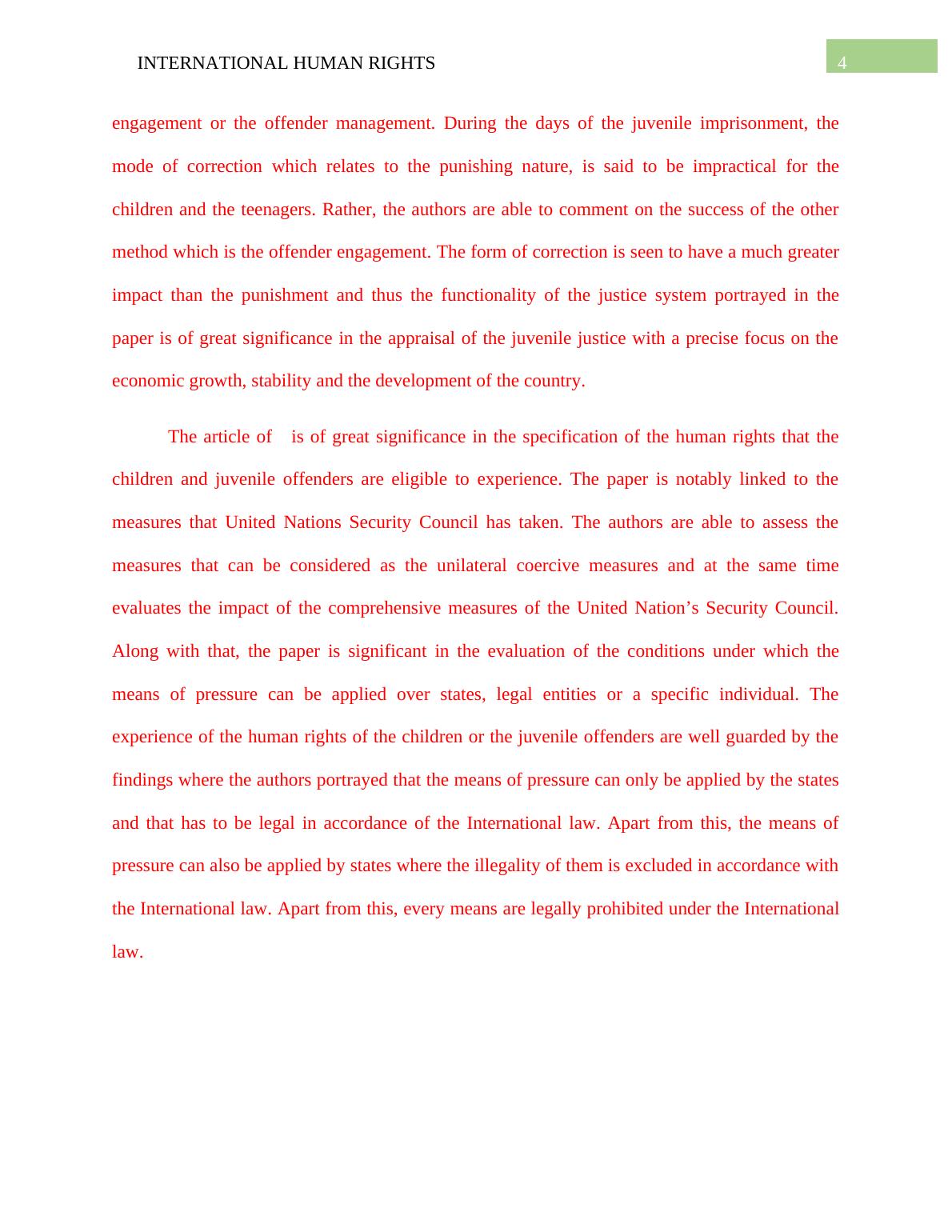
5INTERNATIONAL HUMAN RIGHTS
Topic - AN APPRAISAL OF JUVENILE JUSTICE IN NIGERIA; A CASE STUDY OF
CHILD'S RIGHT TO INDEPENDENT LEGAL REPRESENTATION AND FREE
TRIAL"
Nigeria is one of the most populous sub- Saharan nation having a youth population of
less than 15 years’ age as a predominance. It is quite sorrowful that most of the children in the
country of Nigeria go through a life of poverty, inadequate educational opportunities, family
instability along with poor mental and physical health condition. They are not facilitated with the
opportunity to fulfill their aspirations. This inability has lead the children to face the wrath of the
legal system of Nigeria. As per the views of Atilola et al. (2018), the first priority of the social
Topic - AN APPRAISAL OF JUVENILE JUSTICE IN NIGERIA; A CASE STUDY OF
CHILD'S RIGHT TO INDEPENDENT LEGAL REPRESENTATION AND FREE
TRIAL"
Nigeria is one of the most populous sub- Saharan nation having a youth population of
less than 15 years’ age as a predominance. It is quite sorrowful that most of the children in the
country of Nigeria go through a life of poverty, inadequate educational opportunities, family
instability along with poor mental and physical health condition. They are not facilitated with the
opportunity to fulfill their aspirations. This inability has lead the children to face the wrath of the
legal system of Nigeria. As per the views of Atilola et al. (2018), the first priority of the social
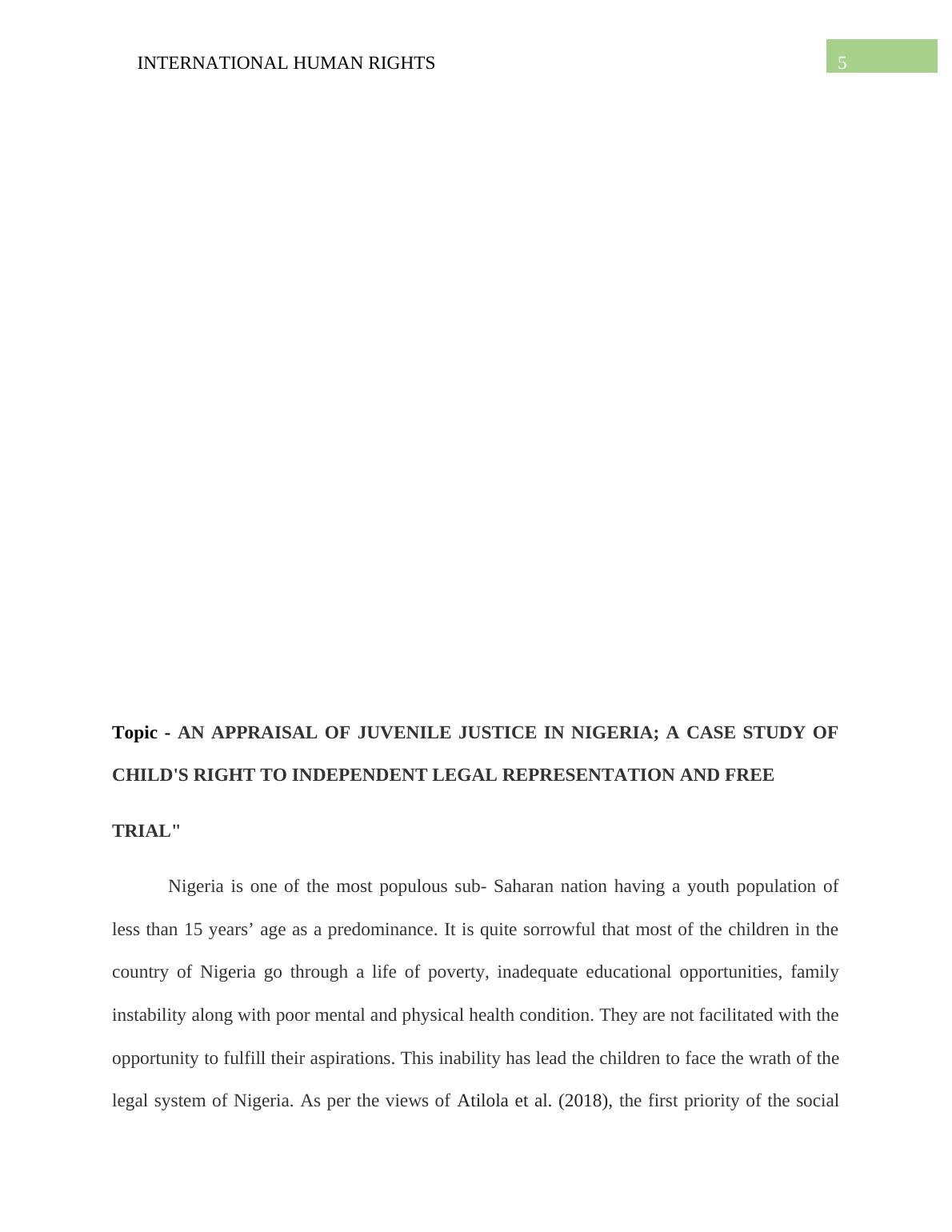
End of preview
Want to access all the pages? Upload your documents or become a member.
Related Documents
Improving Public Health: My Journey to Becoming a Healthcare Professionallg...
|3
|654
|336
Restorative. justice. is approach to justice focusing olg...
|6
|573
|30
International Medical Corps Role Assignmentlg...
|1
|792
|24